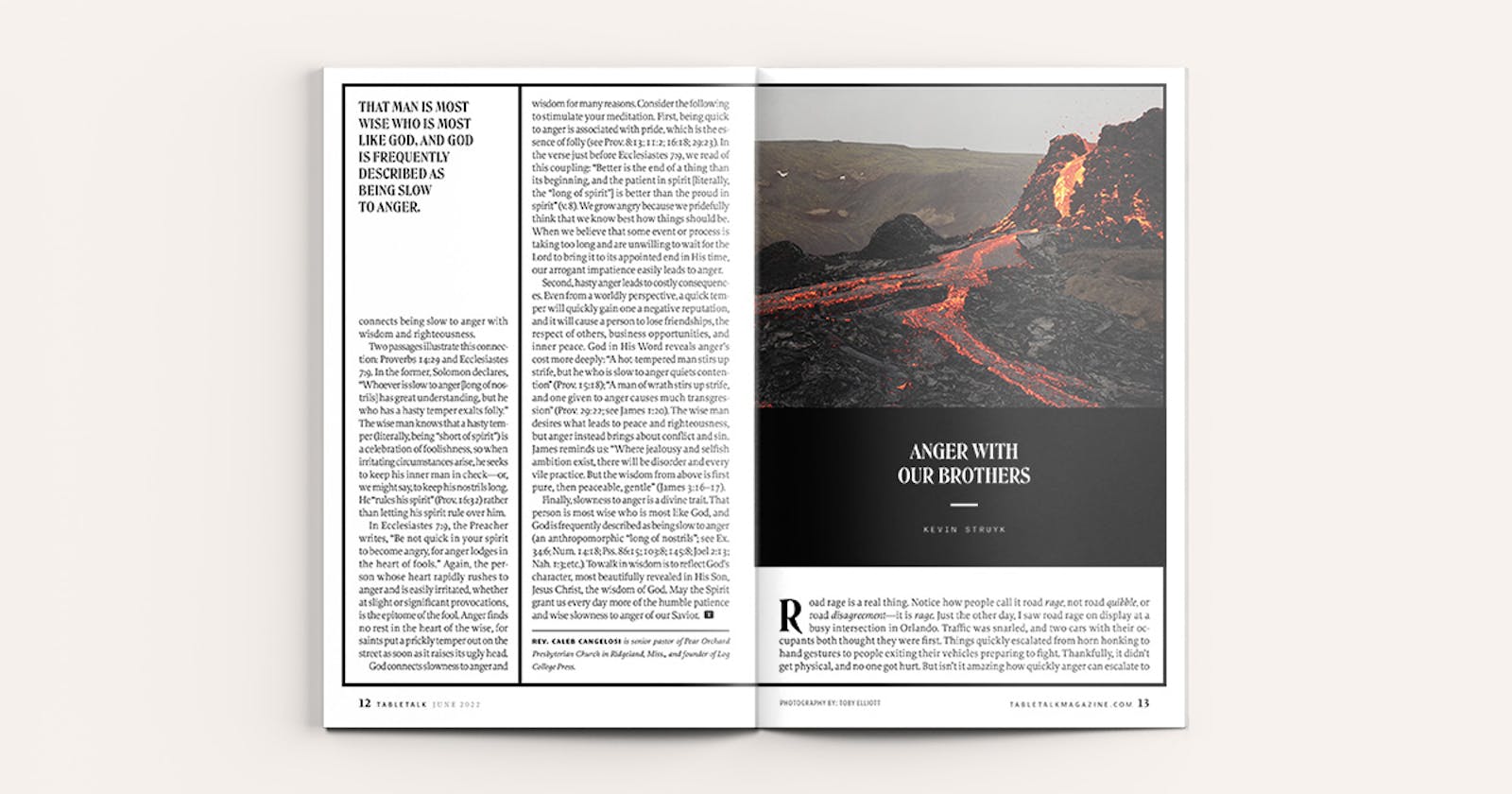
Request your free, three-month trial to Tabletalk magazine. You’ll receive the print issue monthly and gain immediate digital access to decades of archives. This trial is risk-free. No credit card required.
Try Tabletalk NowAlready receive Tabletalk magazine every month?
Verify your email address to gain unlimited access.
Road rage is a real thing. Notice how people call it road rage, not road quibble, or road disagreement—it is rage. Just the other day, I saw road rage on display at a busy intersection in Orlando. Traffic was snarled, and two cars with their occupants both thought they were first. Things quickly escalated from horn honking to hand gestures to people exiting their vehicles preparing to fight. Thankfully, it didn’t get physical, and no one got hurt. But isn’t it amazing how quickly anger can escalate to rage and people begin to think and act irrationally?
Unfortunately, anger isn’t just something that manifests itself on roadways; it manifests itself also in the church and among God’s people. Going back to Adam and Eve’s sons Cain and Abel, we read about the sad and horrific murder of Abel by his brother Cain. God looked with favor on Abel’s sacrifice but not on Cain’s, which resulted in Cain’s irrational and devastating action. The first recorded murder in Scripture, brother against brother, stands as a reminder of what man is capable of when anger festers.
We all know murder is wrong. God made sure His people understood that when He gave the Ten Commandments to Moses in Exodus 20. Even so, Jesus, in teaching His disciples in Matthew 5, wanted to expound on the law and taught not only that murder makes one liable to judgment but that being angry with your brother does so as well (Matt. 5:22)—not to mention the danger of hell-fire if you call your brother a “fool.” This teaching is then connected with our worship of God. In Matthew 5:23–24, Jesus says, “So if you are offering your gift at the altar and there remember that your brother has something against you, leave your gift there before the altar and go. First be reconciled to your brother, and then come and offer your gift.”
If God is to accept our worship and look with favor on our sacrifice of praise, we must come before Him with humble, broken, contrite, trusting hearts, striving for peace with our church family. This principle is found throughout Scripture (Pss. 24:3–4; 51:16–17; Matt. 15:8; Rom. 12:18; Heb. 12:18–20). As disciples of Jesus Christ, we are to regularly examine our own hearts and our relationships, humbling ourselves, looking for the logs in our own eyes and confessing our sins to God and to one another. Pursuing peace and reconciliation with one another ought to be the goal of every Christian. No doubt at times it can be hard and may involve a lengthy process, but it is still worth pursuing. The very fact that our gracious God has provided a way of redemption and lasting peace for you and me through faith in Jesus should lead all of us to be loving, merciful, gracious, and eager to forgive and seek peace with others when necessary.

Failure to seek peace when relationships are strained and failure to maintain purity in our thoughts and actions will result in worship that displeases God. In fact, such worship is a mockery of God. Jesus calls out the Pharisees and scribes in Matthew 15:8–9 and says of them, “This people honors me with their lips, but their heart is far from me; in vain do they worship me.” Our hearts are far from the Lord when we say one thing to give the appearance of righteousness but never intend to follow through. You might say, “I love the Lord,” but then you gossip, harbor ill will, or slander a member of the church––never truly being interested in loving God or loving your neighbor as yourself. If so, repent and confess that sin before you worship again. Or it may be the case that you notice someone giving you the cold shoulder and the seeming lack of love is really affecting you. It may be wise to go and seek peace and reconciliation, for perhaps there is something you said or did to that person for which you can apologize. Jesus’ clear instruction for His church is this: “First be reconciled to your brother, and then come and offer your gift” (Matt. 5:24).
As we seek to honor and glorify the Lord with our lives and with our worship, let us remember that we are all part of the body of Christ. When unjustified anger and division exist between members of the family of God, we should be quick to seek peace and not let anger escalate. In doing so, we show by our words and our actions that we are peacemakers, and blessed shall we be, “for [peacemakers] shall be called sons of God” (Matt. 5:9).
